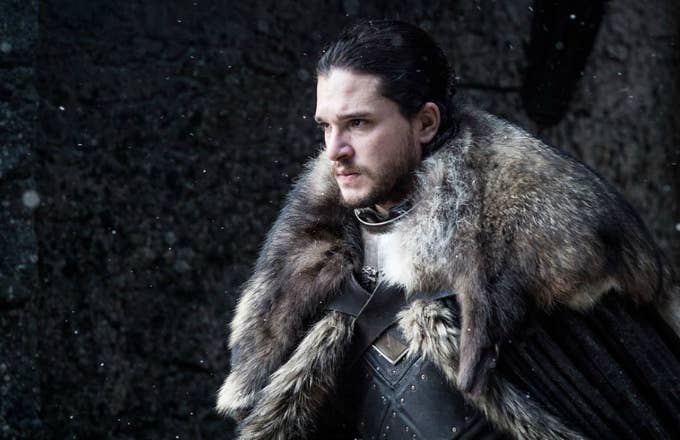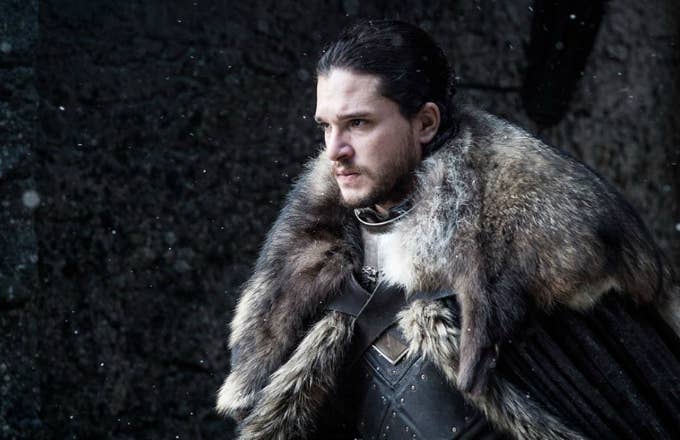
Watching Jon Snow, the Hound, Jorah Mormont, and the rest of the crew head north of the Wall inspired one primary thought in my mind. It lingered over the episode for all 70-plus minutes of run-time, casting a shadow over the rest of Westeros. Game of Thrones is quickly approaching the end of its rope, and there's an overarching thought that connects a lot of the story's main threads—the setup that brought us here is extraordinarily, impressively stupid.
(WARNING: Spoilers will follow from here on out.)
In terms of spectacle, "Beyond the Wall" was up there with any episode the show has ever done. Even before the dragons showed up to save the day, the shots of humanity's hope stranded on a rock, wights staring them down from all sides, illustrated the dire circumstances in Westeros. The claustrophobic battle sequence only made the long-term outlook feel worse, with the best warriors in all the seven kingdoms still being overrun by the sheer numbers of the zombie army.
But it's hard to focus on their dire circumstances when you're asking why they ever made the trip to begin with, and knowing in the back of your mind that consequences for the mistake will be minimal. After all, Jon Snow is at the center of this screw-up, and Game of Thrones has at this point made clear he is borderline untouchable.
In the early seasons of Game of Thrones, and certainly throughout the books that inspired the series, the show had a clear and powerful message about the role of morality in Westeros: it had none. The reason Game of Thrones was able to transcend fantasy and reach an audience as broad as it did was because it treated death as a consequence of stupidity or shortsightedness, rather than a question of good or evil. That point was underlined repeatedly, as so-called "good guys" like Ned Stark, Robb Stark, Renly Baratheon, and many others were killed despite being framed as potential saviors of the realm.
And Thrones made sure those deaths came with a reason—all the men involved made critical mistakes, whether it was trusting the wrong people or just suffering a momentary lapse in judgment. This established what Game of Thrones was all about, with a focus on nihilism rather than a generic battle of good and evil. The constant triumphs of Cersei Lannister are the best example of this; Cersei is by any measure one of the worst, most despicable characters on the show, willing to sacrifice the lives of hundreds, maybe thousands of innocent people in order to obtain and maintain power. In a traditional fantasy story, she would have long since been ousted, yet in Thrones, she sits on the Iron Throne, because she plans for moves multiple steps ahead and is willing to go further than anyone else to get what she wants.
Cersei even explicitly spelled out the nature of the game in season 1, when she shared the infamous description of the stakes: "You win or you die."
Which brings us back to Jon Snow. At this stage, it has become clear he exists within his own realm of consequences, unburdened by the stakes facing any other character on Game of Thrones. His list of poor decisions dwarfs any other character on the show: he got his army surrounded in the Battle of the Bastards, only to have his sister miraculously save the day; he led his group on the suicide mission you saw in "Beyond the Wall," and after he lingered long enough to get a dragon killed, he survived nearly drowning because his long-lost uncle just so happened to come stampeding by on his horse. And, lest we all forget, he was brought back to life after letting his guard down and allowing his own men to kill him two seasons back.
Jon's survival of stupid decisions has become a near-weekly experience at this point, and it dampens the stakes in every situation he finds himself involved in. Even his first meeting with Daenerys has a blip of stupidity, when he surrenders his Valyrian steel sword—one of the most valuable items in Westeros—and leaves himself defenseless to a then-unknown person. Every action, including his doomed-from-the-start quest to bring back a wight, feels like a way to create artificial drama for "heroes" who the universe has decided can't actually be punished, and it feels inevitable that he will triumph.
The death and zombification of a dragon in "Beyond the Wall" should have been a powerful moment, but it was kneecapped by the stupidity of the predicament in the first place. I'm supposed to believe Cersei Lannister, who cares for nothing and nobody outside of her own family, will not just back down from her battle with Jon Snow, but join forces with him, all because he brought back a single wight from north of the Wall? The journey north felt like an excuse exclusively to have a dragon killed and turned in favor of the White Walkers, all in order to add tension into whatever shape the final battle eventually takes.
Jon is not alone in his irrational, misguided decision-making. Back home in Winterfell, the Stark sisters are openly beefing over a note Sansa wrote when she was just a girl, threatened with the possible death of her father. Arya, who is perhaps the world's greatest living assassin that we know of and, accordingly, able to read the thoughts and actions of her targets five steps ahead of them, has devolved into a paranoid mess, unable to discern between real betrayal and a childlike act of desperation.
It's a character rewrite with no justification other than to create more drama, made worse by the fact that Arya is getting duped by Littlefinger, who she knows is a duplicitous snake from her time at Harrenhal. And what was Arya doing in Harrenhal in the first place, way back in the second season? Serving the Lannister family as Tywin Lannister's cupbearer for a full season, the sort of "betrayal" she is now apparently unable to forgive her sister for. Her character hasn't just changed, it is also suffering from amnesia.
To keep the drama flowing and the suspense building, other characters are being straight-up ignored despite their ability to tilt the battle, and means of communication that are otherwise swift have been abandoned altogether. Bran Stark, who has proven to his sisters he has an otherworldly grasp of past events, has been made irrelevant, his sisters not thinking to ask what he knows that could help Jon. Sansa, who Jon left in charge of the entire North, admitted during "Beyond the Wall" she hasn't spoken to Jon in weeks.
This is completely nonsensical! When he left, Jon was going to meet an unknown foreigner in possession of three dragons, a direct descendent of the "Mad King," and a complete unknown in Westeros. Despite having access to ravens that can apparently travel at the speed of sound whenever Jon is in danger, Sansa feels no urgency to stay in the loop with her half-brother while he could be in mortal danger, nor does she think to consult her other brother whose powers could be the greatest asset they have, if used properly.
Game of Thrones the television show passed Game of Thrones the book series two seasons ago, and it's becoming painfully obvious that the writers, devoid of guidance from George R.R. Martin's book series, are leaning heavily into generic fantasy tropes, allowing feelings about the inherent "goodness" of characters to dictate where the story is heading. Instead of feeling like a trapdoor can open under our protagonists at any given time, the men and women at the center of the show appear to be able to stumble ass backwards into survival, and ultimately, power. Remember, you win or you die.
At its best, Game of Thrones inspires comparisons to The Wire, another show where years worth of planning and power-hoarding could be undone in an instant, "heroes" killed because they left their back turned in the wrong bodega. As Season 7 of Thrones comes to a close, it's worth questioning whether the show has any of those moments left, or if we'll have to be content riding a wave of dragons and fan service to the series' conclusion. Will it be entertaining? Sure. But it may not be the show it once promised to be.

